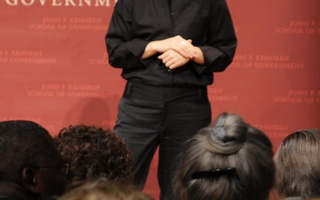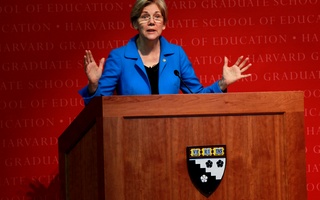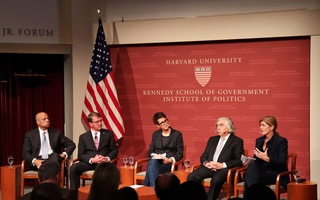MSNBC broadcaster Rachel Maddow took a critical look at America’s state of perpetual war in a discussion of her recently published book, “Drift: The Unmooring of American Military Power” sponsored by the Harvard Book Store Sunday afternoon.
The book—Maddow’s first—explores the evolution of the military’s role after the Vietnam War. In this post-Vietnam era, Maddow argued, the government began to shield Americans from understanding the true cost of war in an effort to sidestep national debate.
The historically unprecedented mix of tax cuts and long wars in Afghanistan and Iraq, Maddow said, are “not the actions of a country that believes it is at war.”
This phenomenon, she continued, was due in large part to the unilateral decision-making of President George W. Bush’s administration.
“Presidents aren’t supposed to wage war on their own,” Maddow said in front of a packed crowd at the First Parish Church in Cambridge. “It’s supposed to be the Congress that makes the decision, and a nice by-product of Congress making the decision is that the debate is out loud and engages the public necessarily. It also makes you have a better debate because you have to win the argument.”
The founding fathers, Maddow continued, designed the Constitution in a way that forced politicians to engage in this sort of public debate.
“It’s not slowing it down for the sake of slowing it down,” Maddow said. “It’s so bad arguments get ferreted out.”
According to Maddow, much of the expansion of presidential power has its roots in the 1986 Iran-Contra affair. To boost public support after the scandal, Maddow said, the Reagan administration adopted the principle that—in a paraphrased version of Nixon’s words—“if the president does it and it’s vaguely related to national security, then it’s not illegal.”
The mantra, she continued “became not just a weird outlier of bizarre legal theory to try to save a president in trouble—it became a template for a new idea of the presidency.”
In a subtle jab, Maddow dedicated her book to former Vice President Dick Cheney, who she said played a large role in the Bush-era effort to downsize Americans’ understanding of the war.
“I can’t think of anything else that might convince him to consent to an interview with me,” she said with a smile.
—Staff Writer Gina K. Hackett can be reached at ghackett@college.harvard.edu.
Read more in News
China Care Carnival Raises Funds for Orphan's SurgeryRecommended Articles
-
The New Red ScareLast weekend's demonstrations against American participation in the Vietnam war have elicited a barrage of criticism. Presidential Press Secretary Bill
-
We’re Talking About PracticeWaxing somewhat Aristotelian, General and 34th President of the United States Dwight D. Eisenhower observed in his first State of
-
 Maddow Discusses Politics and the Media
Maddow Discusses Politics and the Media -
 After Long Wait, Elizabeth Warren Endorses Clinton
After Long Wait, Elizabeth Warren Endorses Clinton -
 Former Obama Officials Talk National Security
Former Obama Officials Talk National Security













